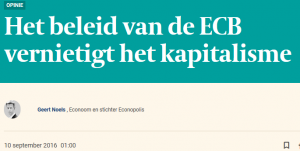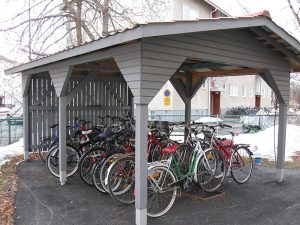Het is bon ton om te beweren dat de financiële sector geen lessen getrokken heeft uit de crisis van 2008. Zoals ik eerder schreef, ben ik het daar niet mee eens.
Dit weekend maakt opinieschrijver Rik Van Cauwelaert het wel heel erg bont in de krant De Tijd. Onder de titel Niets geleerd haspelt hij zijn bekende riedeltje af. De uitspraken van enkele ‘grote namen’ moeten aantonen dat banken en verzekeringsmaatschappijen de risico’s opstapelen.
Van Cauwelaert schrijft letterlijk:
“De bankiers hebben duidelijk niets geleerd en vooral niets onthouden van de financiële crisis.”
Ironisch genoeg geeft zijn opiniestuk blijk van een gebrekkige financiële kennis. Hier zijn drie voorbeelden, ik kon ook andere nemen:
“De banken zijn intussen verslaafd aan goedkoop geld” – Dit is een nutteloze metafoor. Maar laten we er van uitgaan dat banken inderdaad niet zonder ‘goedkoop geld’ (=lage rentes) kunnen. Waarom zijn de Amerikaanse banken dan nog niet failliet? In de VS is de kortetermijnrente van de Federal Reserve sinds eind 2015 immers al met 1,5% gestegen.
“de spaarders van wie het geld goedkoop werd uitgeleend” – Banken lenen geen spaargeld uit, stop met deze nonsens te verspreiden!
“Mocht het ooit tot een wereldwijde synchrone implosie van al die activazeepbellen komen, dan zal blijken dat de westerse centrale banken al hun kruit hebben opgebruikt.” – Ook deze bewering klopt niet. Centrale banken kunnen perfect werken met een negatief kapitaal. Er zijn beleidsinstrumenten mogelijk die de ECB en andere centrale banken nog niet gebruikt hebben.
Lezers van deze blog weten al langer dat je wat in de media komt met meer dan één korreltje zout moet nemen.
Maar het ergst van al is dat sommige mensen zich bang laten maken door ‘experts’ als Rik Van Cauwelaert, waardoor ze al heel veel geld mislopen zijn.
Als je wil weten hoe banken echt werken, lees dan mijn boek Hoe bankiers geld scheppen.



